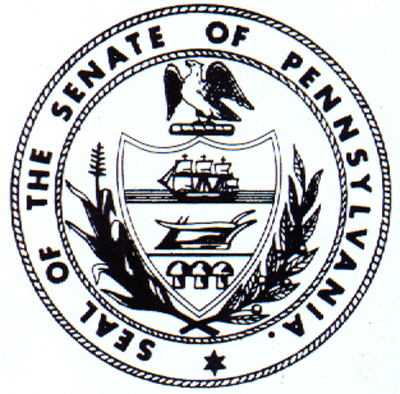FUMO TRIES TO FORCE LEGISLATIVE REFORMS OUT OF
COMMITTEE
HARRISBURG, August 9, 2006 – In an attempt to
bring meaningful legislative reform measures to the floor of the Senate before
the end of the legislative session, state Senator Vince Fumo (D-Philadelphia)
has filed discharge resolutions for three separate bills that he introduced
earlier this year.
The bills would halt “sneak legislation” and would open the legislative process
to both the public and to rank and file members of the General Assembly by
increasing opportunities for public hearings, and by requiring time for public
scrutiny of bills once they are in their final form. The measures were drafted
in consultation with the public interest lobby Common Cause, and have received
the organization’s endorsement.
“This summer there has been
a lot of talk by public officials about legislative reforms. These
three bills that would provide meaningful benefit to the public have languished
in committee, without a hearing or consideration,” Fumo said. “This is despite
majority or near-majority initial support in the Senate.”
Unlike concepts such as reducing the size of the
Legislature and eliminating the lame duck session entirely, these reforms do not
need a constitutional amendment. They can be done statutorily, although Fumo
also plans re-introduce the legislation as constitutional amendments after the
newly elected legislature takes office next January.
“I intend to seek passage of this package when the
Senate reconvenes in September,” Fumo said. “There has been a lot of talk about
legislative reform, but little action. This is a tangible act that could have
immediate, positive results for the people of Pennsylvania.”
click here
to listen to Sen. Fumo talk about the discharge resolutions
The three bills, which already have significant Senate
support, indicated by a large number of co-sponsors, have been locked in
committee since being referred on April 26. Senate Bill 102 and SB 103 are in
the Rules Committee, while SB 104 is in the Judiciary Committee.
SB 102 has 26 co-sponsors and the other two each have
24 co-sponsors in the 50-member Senate. (A description of three bills is
appended.)
A discharge resolution is a mechanism by which the
Senate may remove a bill from committee if it has been before that committee for
longer than 10 legislative days. The package of Fumo reform bills have been in
their respective committees for 19 legislative days.
A discharge resolution may be adopted by a simple
majority vote, and if passed, would then permit the entire Senate to consider
and vote on a bill without waiting further for committee action.
Fumo stressed that if the Legislature deals with his
reform proposals quickly upon its return to Harrisburg in September, they could
be enacted into law in time to apply to the so-called “lame duck” session after
the November 7 election. Fumo intends to offer amendments to the bills to have
them take effect in time for the lame duck session.
“This could be an important tool to prevent improvident
and sneak legislation, which we sometimes see in the lame duck session,” Fumo
said.
#
Senate Bill 102,
which has 26 co-sponsors, would mandate that each vote taken in the House or
Senate be posted on the Internet site of that particular chamber within 24 hours
of the vote. Committee votes would have to be posted within 48 hours. The bill
would also require the complete journal of each legislative session day to be
posted on the Internet within 30 calendar days. It would further mandate that a
Legislative Data Processing Committee maintain a publicly accessible database of
the official version of all statutory laws of the Commonwealth. Currently, only
private companies have maintained such databases.
Senate Bill 103, which has 24 co-sponsors, would
require that no bill be passed until it has been in its final form, as amended,
for at least 72 hours. This is intended to prevent the gut-and-amend process by
which a piece of legislation appears on the legislative calendar for three days
as required by the state Constitution, then is amended at the 11th hour, often
with dramatically different provisions than those contained in the original
bill.
Similarly, no bill could be approved by a committee
unless it has been in the considered form for at least 48 hours, and no
amendment could be added to a bill in committee unless it has been publicly
available for at least 24 hours.
The final version of any bill that would require the
expenditure of state funds would have to be referred to the Appropriations
Committee of either chamber and receive a fiscal note prior to passage.
The bill would also allow 10 percent of the elected
members of either the House or Senate to sign a petition requiring a public
hearing on the final version of any bill prior to passage.
Senate Bill 104, which has 24 co-sponsors, deals
with enforcement of SB102 and SB103, and with other laws of the state concerning
the manner in which bills are passed. It would grant legal standing to every
adult resident of the Commonwealth to challenge in court, within one year of
enactment of a bill, the legislature’s compliance with those legal requirements.
# # #


